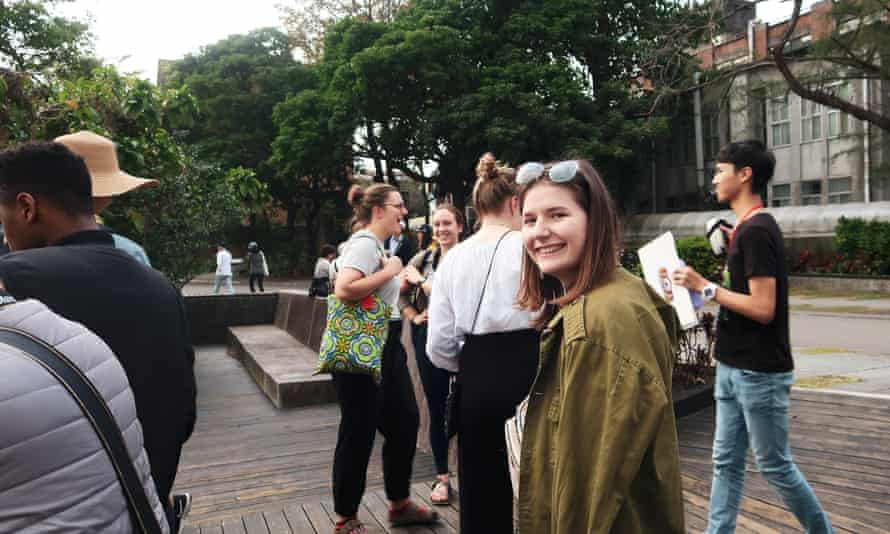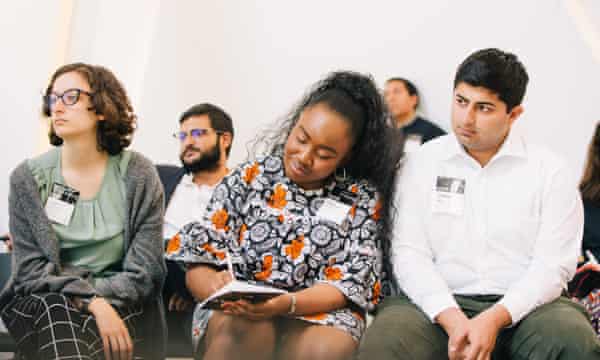
No one could accuse CEO and businessman Ben Nelson of lacking ambition. “I wanted to create a university that serves as a model for other institutions, by being indisputably the best university in the world,” he says, bouncing up and down on a video call from his San Francisco office. “Unless you demonstrate that you are the absolute best, that you can provide an education that Harvard, Cambridge and Oxford cannot come close to, no one will listen. And we are doing exactly that.”
In 2012 Nelson founded the Minerva Project, a venture-backed Silicon Valley startup, with the aim of revolutionising higher education. It partnered with the Keck Graduate Institute to create Minerva Schools at KGI, a non-profit university programme headquartered in San Francisco. This year Minerva received 25,000 applications from 180 countries for undergraduate entry in 2020 and admitted just 2% of them, making it the most selective degree programme in the developed world.
One draw is Minerva’s unusual curriculum, which is rooted in Nelson’s student campaigning at the University of Pennsylvania 25 years ago. “I realised that colleges were fundamentally failing in their promise to educate,” he says. “A liberal arts education is supposed to teach students to think freely, critically and logically. But our elite universities no longer do that at all.”
The Minerva offering is very different to what most UK students were accustomed to, prior to the coronavirus pandemic shifting universities online. There are no lectures, faculty buildings, or exams. All teaching is done through online video classes. There is only one programme of study for first years, and rather than reading maths or history, students take courses aimed at teaching transferrable skills such as critical thinking and problem-solving, through classes named “multimodal communications”, “empirical analyses” and “complex systems”. Subject specialisms are chosen in the second year. There is no campus; students are housed in a residence hall in San Francisco in their first year. Subsequent year groups spend semesters variously in Seoul, Hyderabad, Berlin, Buenos Aires, London and Taipei.

The first undergraduate class enrolled in 2014. Among them was British teenager Kayla Cohen, who, armed with top A-level grades, had been selected out of 2,000 applicants to join a cohort of just 30 freshers. “It was a privilege, it was exciting,” says Cohen, now a 25-year-old graduate. “I remember the thrill of going to San Francisco, meeting my class, and feeling like I was joining the birth of something special.”
Minerva’s first class graduated in 2019, and of 103 students, 94% were in full-time positions or graduate programmes within six months. Just under a fifth (16%) have landed roles in the technology sector, and graduates have gone on to work at such companies as Google, Twitter, Uber and Razor Labs.
Twenty-year-old Jade Bowler has just completed her first year at Minerva, and admits she was sceptical when she first learned about the institution from an online advert. “I was half-convinced it was a scam, it sounded like a cult,” she says. Bowler originally planned to read biology at Bristol University, so there was surprise when she decided to go to an obscure new US university. “I posted about my choice on social media and had thousands of people telling me not to go. But I just had a gut feeling that this was the future of education.”
Minerva’s appeal, Bowler says, was its practical teaching style. “It’s so different from just sitting in a lecture theatre. You learn as you do, not learn by rote. And I have learned so much more in the past year than in any year of my life.”
According to Nelson, this is what makes Minerva different to its traditional counterparts, where “students sit in a class, they’re not called upon to answer questions, or apply the content to novel contexts. A professor simply talks to them.” He adds: “Six months after their exams, students will have forgotten 90% of the course content – because they were never really taught it.”
Study after study has shown the efficacy of active learning, and Nelson says Minerva has taken that research and implemented it. As such, professors are not supposed to speak in classes for any longer than a few minutes at a time, and students are expected to contribute to class discussions and group work.
The online live video platform Forum is instrumental in facilitating this. “To achieve this kind of education, you have to have data,” says Nelson. “You have to actually be able to track how engaged every single student is.” This is achieved through a system that colour-codes students based on how much they talk in class.
Allison Littlejohn, professor of learning technology at University College London, worries about the implications of data gathering for students. “Staff can see when a student logs on, how long they spend on an activity, how much they contribute to a discussion. There are real problems with this method: it puts a lot of pressure on students, and there are issues with privacy and surveillance. Everything a student does is monitored.”
Currently half a dozen UK students have offers to study at Minerva this autumn. But despite its undeniable novelty, Littlejohn is doubtful that a university without lecture halls, societies and sports teams has mass appeal. “Lots of people go to campus-based universities not just for love of their subject, but for the whole experience of being a student on a campus, and all the social and extracurricular opportunities that offers,” she says.
But Nelson believes the lack of a campus is a draw for some students. “At Minerva, you live in the heart of a city, in seven different countries,” he says. “There’s no campus cafeteria, or bar, or gym – your gym is the gym at the end of the road. Instead, you live as an adult in a city. You learn to be a global citizen.”
Either way, Minerva’s innovations certainly pose a challenge to a sclerotic university model in both the US and the UK. Even if the venture does not upend the landscape of higher education in the way Nelson intends, campuses across the world will at some point have to address the deficiencies he identifies – and many already are as a result of the pandemic.

“Many campuses are now realising the importance of flexible online learning, flipped classrooms, and interdisciplinary programmes,” Littlejohn agrees. But she adds: “There will always be a place for the campus, and for in-person teaching. At a campus with world-leading researchers, you see how academics spend their time and what they do. You see first-hand how knowledge is created.”
The other crucial question is what’s really driving the success of Minerva’s graduates. Nick Hillman, director of the Higher Education Policy Institute, says: “A mix of excellent pre-university qualifications and a hyped-up higher education is likely to be a winning one. It is worth noting that it is much easier to deliver an excellent education to people with high prior qualifications than to students with more challenging backgrounds.”
For the time being, Minerva graduates seem satisfied with their gamble. “I’ve learned so much, and I’m not sure I’d leave any other university with that same conclusion,” says Liberty Pim, who has just finished her final year. “Minerva built a completely new university without the constraints of a traditional university. When I applied it felt like a big risk, but it paid off.”